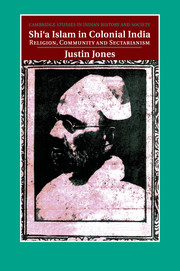Book contents
- Frontmatter
- Contents
- Figures and maps
- Preface and acknowledgements
- Frequently used abbreviations
- Note on transliteration
- Select glossary of terms
- Introduction
- 1 Madrasas, mujtahids and missionaries
- 2 Mosques, majalis and Muharram
- 3 Anjumans, endowments and Indian Shi‘ism
- 4 Aligarh, jihad and pan-Islam
- 5 The tabarra agitation and Shi‘a–Sunni conflicts in late colonial India
- Conclusion and epilogue Shi‘ism and sectarianism in modern South Asia
- Appendix Select Shi‘a ‘ulama of colonial India
- Select bibliography
- Index
Appendix - Select Shi‘a ‘ulama of colonial India
Published online by Cambridge University Press: 05 November 2011
- Frontmatter
- Contents
- Figures and maps
- Preface and acknowledgements
- Frequently used abbreviations
- Note on transliteration
- Select glossary of terms
- Introduction
- 1 Madrasas, mujtahids and missionaries
- 2 Mosques, majalis and Muharram
- 3 Anjumans, endowments and Indian Shi‘ism
- 4 Aligarh, jihad and pan-Islam
- 5 The tabarra agitation and Shi‘a–Sunni conflicts in late colonial India
- Conclusion and epilogue Shi‘ism and sectarianism in modern South Asia
- Appendix Select Shi‘a ‘ulama of colonial India
- Select bibliography
- Index
Summary
This section offers brief biographical synopses of a number of the most prominent ‘ulama discussed in this book; they are just a select few among the many influential and significant mujtahids and scholars active in north India around 1870–1940. Where appropriate they have been grouped by household (khandan-wada), the wider idea of family relational groups bonded by biradari links and endogamy.
The Kintori ‘ulama
Descendants of the Seventh , Moussa, the sayyids who settled in the qasba of Kintor, Barabanki district, around the thirteenth century were of Nishapuri origin. Many of them matured as ‘ulama, and were settled on nazrana land grants in Barabanki and Bahraich districts of Awadh, which they largely retained into the colonial period. Kintor produced a number of related and exemplary scholars from the eighteenth century onwards; alongside those named here, this biradari included Sayyid Ahmad Moussawi Hindi, the paternal grandfather of Ruhollah Khomeini, who emigrated from India to Iran in the 1830s.
- Type
- Chapter
- Information
- Shi'a Islam in Colonial IndiaReligion, Community and Sectarianism, pp. 243 - 250Publisher: Cambridge University PressPrint publication year: 2011



